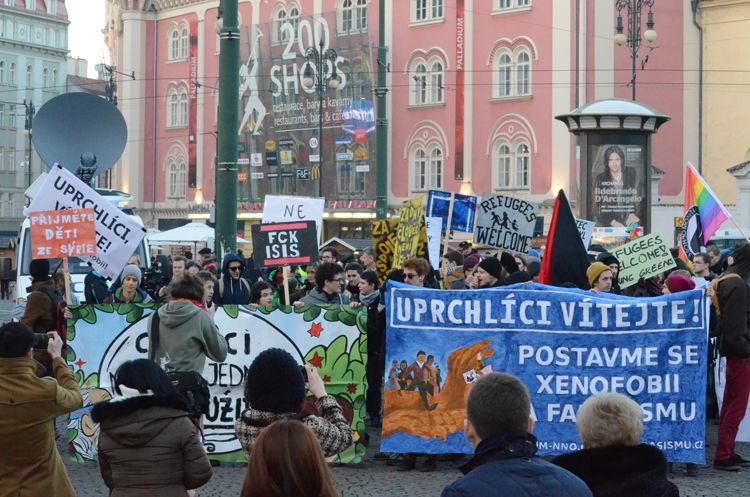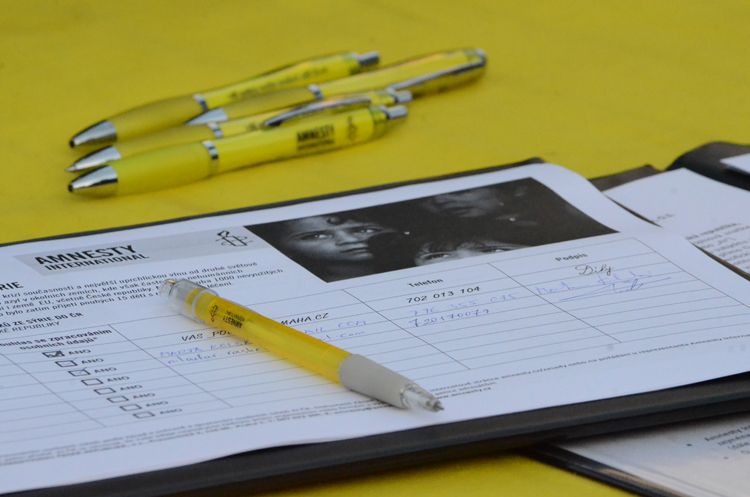Nobody is Illegal in the Czech Republic


In the past three months, Czech citizens showed concern regarding xenophobia and Islamisation, which has triggered the rise of political activism.
Recent shootings in Paris and Copenhagen encouraged discussion on various levels of the society and divided it in two polar views. Both sides of the argument surprisingly agree that Czechs are not xenophobic, however, are unwelcoming and closed towards foreigners.
“Nobody is illegal,” shouted around 300 attendees of a demonstration “Refugees Welcome” held Feb. 20, 2015 in Prague. The demonstration was organised by “No to Racism,’’ a self-described ‘’leftist initiative’’ and the Consortium of Migrants Assisting Organisations in Czech Republic.
The demonstration’s goals were to promote religious freedom, provide legal assistance to the refugees, spread their political agenda, and decrease anti-Muslim tensions, said CMAO spokesperson Magda Faltova.
Various religious and age groups came to support the movement. “It can bring new ideas,” said Lucka Piklova, who was there with friends.
According to Faltova the demonstration is a response to the movement “We Don’t Want Islam in CR,” which is trying to eliminate Islam around the country.
Artur Fiser, the anti-Islam movement spokesperson, is convinced that accepting refugees is a security threat to Europe. “The main goal of Islam is the same as the Islamic State’s – to impose a worldwide Caliphate,” said Fiser.
However, he suggested that providing assistance on the spot (conflict zones) is more effective and less costly.
The movement is concerned with possible European Islamisation and the establishment of Sharia Law.
However, an anonymous Muslim attendee of the anti-racism demonstration rejected any connection between Islam and ISIS’ agenda. According to her, the perception of Muslims in Prague has worsened in the last six years. “People do not directly insult me [for religious views], however, the way they look at me is often unpleasant.”
Fiser disagrees. Muslims are the victims of their faith and should either convert to another religion or become faithless in order to live peacefully in Europe, he argues.
Where to draw the line between freedom of speech and incitement of hatred was the main question raised at a panel discussion on the post-Charlie Hebdo events at Prague’s Anglo American University on Feb. 26.
Panelists expressed their concern with the rise of radical Islamic activism in Europe and correlated anxiety among citizenry.
“The pencil is becoming mightier than the sword,” said AAU professor Daniela Chalaniova, referring to the shootings. Clement Steuer from the Oriental Institute and Czech Academy of Science added that even though France is religiously neutral and have a long-standing relationship with the Muslim community it is still fighting with xenophobia and racist movements.
The last speaker, Jakub Janda, a representative from the European Values think-tank, is sure that in order to issue reasonable and effective policies towards radical Islamists it is necessary to set up a discussion in a political space. Moreover, decisions should be scrutinised in order not to repeat the mistakes of the Bush administration after 9/11.
Those events have contributed to a misperception of Muslims in Europe and misuses of religious figures for convenient political ideology, both by the West and the Islamists. Furthermore, they triggered an incredible increase in support of far right parties and revealed problems with the immigration policies of the EU.
After long negotiations, the Czech government accepted 15 Syrian refugee families in January 2015. At the demonstration, Amnesty International promoted a petition to accept another 100 Syrian refugees.
Although many Czechs are worried about the growth of the Muslim minority, it is still impossible to say that the nation is xenophobic.
Photos: Kristina Zakurdaeva and Katerina GlacnerovaMentoring: Prof. Andrew Giarelli (Anglo-American University in Prague)
Proofreading: Natalie Menezes Kristina Zakurdaeva and Katerina Glacnerova are students of the Anglo-American University in Prague, Czech Republic.



